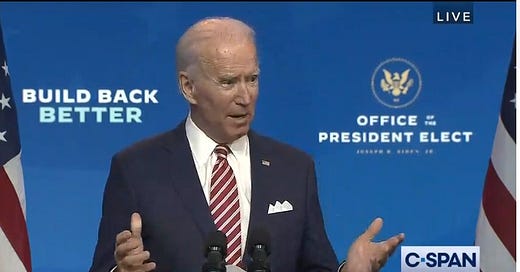Biden’s Curious Strategy as Trump Assaults American Democracy
Pres. Trump has launched a frontal attack on the US system of government and on the Biden presidency. Biden's tactical response reveals much about his beliefs, his strategy, and his administration.
Highlights This Week — Scroll Down for:
Biden’s Strategy: Is He Right?
When is the Election Really Final: a Cheat Sheet
Iran and the US: During and After Trump
Venezuela: The Revolution Devours its Own
Ethiopia: a Quick Dash From Nobel Peace Prize to War
Bonus Postscript: Gallows Humor


